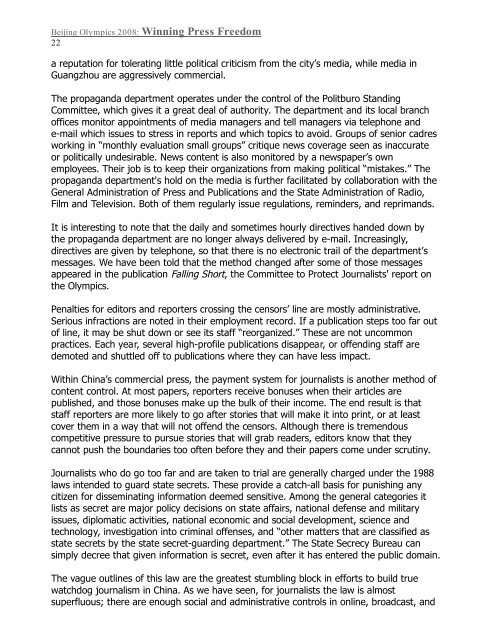Beijing Olympics 2008: Winning Press Freedom - World Press ...
Beijing Olympics 2008: Winning Press Freedom - World Press ...
Beijing Olympics 2008: Winning Press Freedom - World Press ...
Create successful ePaper yourself
Turn your PDF publications into a flip-book with our unique Google optimized e-Paper software.
<strong>Beijing</strong> <strong>Olympics</strong> <strong>2008</strong>: <strong>Winning</strong> <strong>Press</strong> <strong>Freedom</strong><br />
22<br />
a reputation for tolerating little political criticism from the city’s media, while media in<br />
Guangzhou are aggressively commercial.<br />
The propaganda department operates under the control of the Politburo Standing<br />
Committee, which gives it a great deal of authority. The department and its local branch<br />
offices monitor appointments of media managers and tell managers via telephone and<br />
e-mail which issues to stress in reports and which topics to avoid. Groups of senior cadres<br />
working in “monthly evaluation small groups” critique news coverage seen as inaccurate<br />
or politically undesirable. News content is also monitored by a newspaper’s own<br />
employees. Their job is to keep their organizations from making political “mistakes.” The<br />
propaganda department's hold on the media is further facilitated by collaboration with the<br />
General Administration of <strong>Press</strong> and Publications and the State Administration of Radio,<br />
Film and Television. Both of them regularly issue regulations, reminders, and reprimands.<br />
It is interesting to note that the daily and sometimes hourly directives handed down by<br />
the propaganda department are no longer always delivered by e-mail. Increasingly,<br />
directives are given by telephone, so that there is no electronic trail of the department’s<br />
messages. We have been told that the method changed after some of those messages<br />
appeared in the publication Falling Short, the Committee to Protect Journalists' report on<br />
the <strong>Olympics</strong>.<br />
Penalties for editors and reporters crossing the censors’ line are mostly administrative.<br />
Serious infractions are noted in their employment record. If a publication steps too far out<br />
of line, it may be shut down or see its staff “reorganized.” These are not uncommon<br />
practices. Each year, several high-profile publications disappear, or offending staff are<br />
demoted and shuttled off to publications where they can have less impact.<br />
Within China’s commercial press, the payment system for journalists is another method of<br />
content control. At most papers, reporters receive bonuses when their articles are<br />
published, and those bonuses make up the bulk of their income. The end result is that<br />
staff reporters are more likely to go after stories that will make it into print, or at least<br />
cover them in a way that will not offend the censors. Although there is tremendous<br />
competitive pressure to pursue stories that will grab readers, editors know that they<br />
cannot push the boundaries too often before they and their papers come under scrutiny.<br />
Journalists who do go too far and are taken to trial are generally charged under the 1988<br />
laws intended to guard state secrets. These provide a catch-all basis for punishing any<br />
citizen for disseminating information deemed sensitive. Among the general categories it<br />
lists as secret are major policy decisions on state affairs, national defense and military<br />
issues, diplomatic activities, national economic and social development, science and<br />
technology, investigation into criminal offenses, and “other matters that are classified as<br />
state secrets by the state secret-guarding department.” The State Secrecy Bureau can<br />
simply decree that given information is secret, even after it has entered the public domain.<br />
The vague outlines of this law are the greatest stumbling block in efforts to build true<br />
watchdog journalism in China. As we have seen, for journalists the law is almost<br />
superfluous; there are enough social and administrative controls in online, broadcast, and





